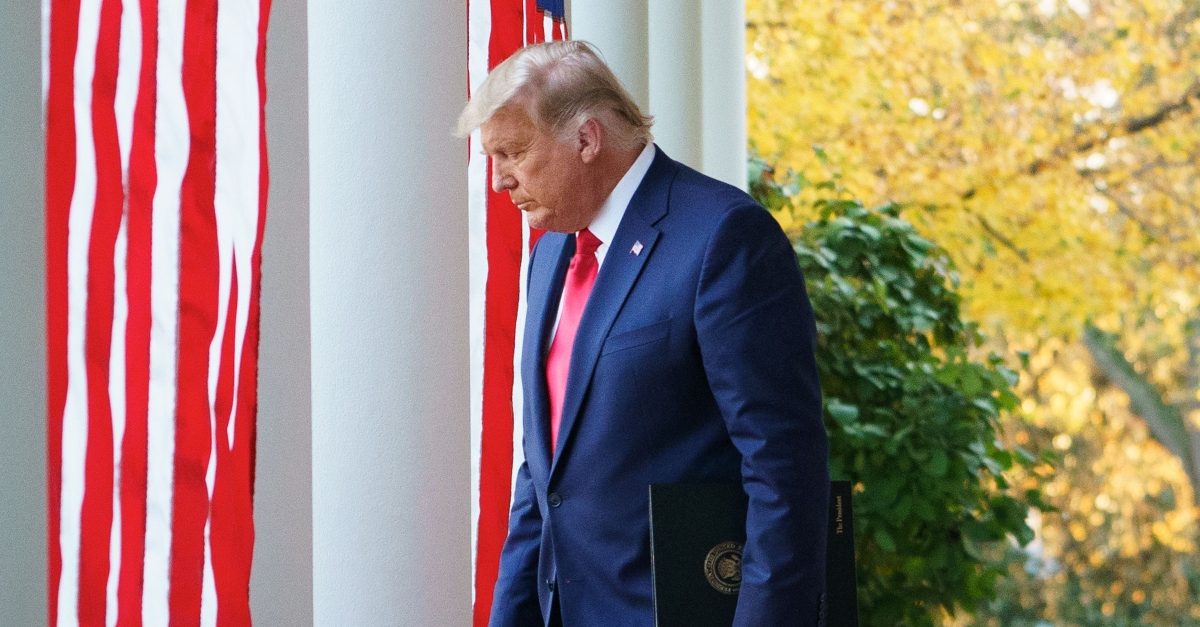
A state appeals court in Pennsylvania rejected one of President Donald Trump‘s few remaining election lawsuits late Wednesday.
“Importantly, the Court must point out that there are absolutely no allegations of any fraud, impropriety, misconduct, or undue influence, that anyone voted who was not eligible to vote, or that the secrecy of the ballots cast was jeopardized,” Judge Renée Cohn Jubelirer noted in her conclusion. [emphasis in original]
As Law&Crime previously reported, Trump campaign attorneys agreed with Democratic Party attorneys on the absolute lack of fraud or otherwise in relation to Bucks County mail-in ballots earlier this month.
“Petitioners do not allege, and there is no evidence of, any fraud in connection with the challenged ballots,”a joint stipulation agreement signed by both sides’ legal teams averred.
So, what, exactly was the matter at hand? Sixty-nine ballots with “unsealed” secrecy envelopes.
Technically, the Trump campaign was also disputing an additional 1,926 mail-in ballots with various alleged deficiencies—but a recent Pennsylvania Supreme Court ruling in a separate election case dispensed with those claims. The Trump campaign also withdrew challenges to 253 of them at a hearing. So the Commonwealth Court’s Wednesday opinion restricted its findings to the 69 ballots that remained.
According to Judge Jubelirer, during a recent hearing, evidence was presented that none of those allegedly “unsealed” secrecy envelopes were even sealed in the first place. Additional evidence, provided by the county, showed that “the privacy of the ballots [were not] jeopardized in any manner.”
From the opinion:
[T]here was no “way to determine by the board whether or not [the secrecy envelope] had been sealed at one point and became unsealed.” [The canvassing board director] testified that the board provided the envelopes, including the secrecy envelopes, which were the type that had “to be either moistened by licking or water or glue,” and agreed that people would have to rely on the type of envelopes provided by the board as to the quality of the seal. [The director] agreed that the board discussed the possibility that voters may have concerns about licking the envelopes, given the pandemic, which appeared to be a factor in its decisions.
While conceding that state law and the aforementioned state Supreme Court decision means that the “directive [to securely seal the ballot secrecy envelope] is mandatory such that an elector’s noncompliance results in a ballot that is not valid,” the court decided against a “strict interpretation” of the law for the current election because of the uncertainty that accompanied Pennsylvania’s first real foray into universal mail-in voting.
The court did say that the stricter approach would likely be adopted in the future—which, of course, is little consolation for Trump and his allies.
“[T]his court recognizes the tremendous challenges presented by the massive expansion of mail-in voting, and the lack of precedential rulings on the requirement of a ‘securely sealed’ secrecy envelope,” Judge Jubelirer noted. “Moreover, the parties stipulated in this case reveals that the instructions on the outer envelope for the elector stated only that the ballot should be placed in the secrecy envelope and did not specify that the envelope needed to be securely sealed or the consequences of failing to strictly adhere to that requirement.”
“Moreover, in this case, it cannot be established that the electors did not seal the secrecy envelope,” the opinion continued. “For these reasons, the decision of the court will be applied prospectively, and the 69 ballots will not be invalidated.”
The case, like so many similar efforts in courts across the country, never stood a chance of changing the 2020 results in the Keystone State due to the exceedingly small number of ballots at issue.
Read the full opinion below:
[image via MANDEL NGAN/AFP/Getty Images]